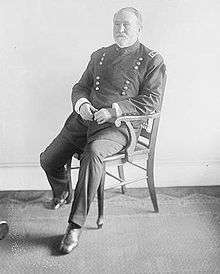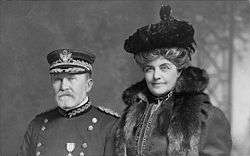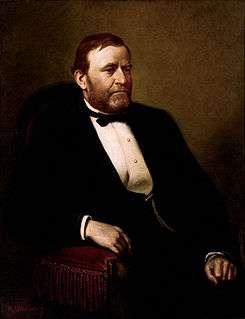Frederick Dent Grant
| Frederick Dent Grant | |
|---|---|
 Grant in 1908 | |
| Military Governor of Pampanga | |
| Personal details | |
| Born |
May 30, 1850 St. Louis, Missouri |
| Died |
April 12, 1912 (aged 61) Governors Island, New York |
| Relations |
|
| Children |
Julia Dent Grant Ulysses S. Grant III |
| Parents |
Ulysses S. Grant Julia Grant |
| Military service | |
| Allegiance | United States of America |
| Service/branch | United States Army |
| Years of service | 1871–1881, 1898–1912 |
| Rank | Major General |
| Unit | 4th Cavalry Regiment |
| Commands |
14th New York Volunteers Department of the East |
| Battles/wars |
Spanish–American War Philippine–American War |
Frederick Dent Grant (May 30, 1850 – April 12, 1912) was a soldier and United States minister to Austria-Hungary. Grant was the first son of General of the Army and President of the United States Ulysses S. Grant and Julia Grant. He was named after his uncle, Frederick Tracy Dent. The Grant family came from a line of Scottish and Irish heritage.
Early life
His father was in the United States Army when Frederick was born in St. Louis, Missouri. The family moved as the senior Grant was assigned to posts in Michigan and New York. Frederick spent his early childhood at his paternal grandparent's house while his father was stationed on the West Coast. After his father's resignation from the army, the family lived in St. Louis and in Galena, Illinois. He attended public school in Galena until the outbreak of the American Civil War in 1861. Grant's father organized a volunteer regiment and was made colonel. Frederick accompanied his father when the regiment was sent to northern Missouri, but he was sent home when it arrived. He then rejoined his father off and on at several campaigns during the war.
Early military career
Grant was appointed to West Point in 1866 and graduated in 1871.[1] He was assigned to the 4th U.S. Cavalry Regiment. He took a leave of absence to work with the Union Pacific Railroad as a civil engineer. Late in 1871, he was aide-de-camp to General William Tecumseh Sherman in Europe. He rejoined the 4th Cavalry in Texas in 1872.
In 1873, he was assigned to the staff of General Philip Sheridan and promoted to lieutenant colonel. He was on the Yellowstone Expedition and was with George Armstrong Custer during the Black Hills expedition.
In 1874, Grant married Ida Marie Honoré (1854–1930), the daughter of Henry Hamilton Honoré, who made his fortune in Chicago real estate. They were married in Chicago and had two children: Julia Dent Cantacuzène Spiransky-Grant (born 1876) and Ulysses S. Grant III (born 1881). (Note: Ulysses S. Grant IV was the son of Ulysses S. Grant, Jr.)
His daughter Julia was born on June 6, 1876. Grant received leave to travel to Washington, D.C. for her birth.
In 1877, he took a leave of absence to accompany his father on a trip around the world.
In 1878, Grant was in the Bannock War and was in the fight against Victorio in New Mexico.
West Point controversy
On June 1, 1870, the first black cadet, James Webster Smith, from South Carolina, was admitted into the United States Military Academy. Smith was sponsored by Senator Adelbert Ames of Mississippi and nominated by Representative Solomon L. Hoge of South Carolina. Smith was hand picked for his outstanding character and scholarly ability by David Clark, a northern philanthropist. While at West Point, Smith was forced to endure immense racism, violence, and shunning by other West Point attendees. Smith's harassers included Frederick Dent Grant, a fellow cadet. The instigators, including Fred, were intent on driving Smith from the Academy.[2]
Smith wrote to Clark about the racial hazing, whereupon Clark went to the White House to talk with President Grant. Fred was also at the meeting between Clark and the President. Clark advocated that Grant stop the hazing. Grant said, "Don't take him away; the battle may as well be now as anytime." The young Fred was noted to say in front of his father, "the time had not come to send colored boys to West Point." When Clark disagreed, Fred said, "Well, no damned nigger will ever graduate from West Point." Smith was later discharged after failing an unconventional private examination test by Professor Peter S. Mitchie. While Fred Grant denied being a leader of the cadets who hazed Smith for being an African American, there is evidence to suggest he actively participated.[2] (Smith died of tuberculosis in 1876; he was granted a posthumous commission in the United States Army in 1997.) [3]
Civilian career
He resigned from the army in 1881,[1] and assisted his father in preparing the latter's memoirs. During this time, he was in business in New York City.
In 1887, he ran on the Republican ticket for Secretary of State of New York, but was defeated by the Democratic incumbent Frederick Cook.
In 1889, President Benjamin Harrison appointed him Minister to Austria-Hungary. After Grover Cleveland became president, Grant was allowed to continue in his post. Grant resigned in 1893.[4]
Grant became a commissioner of police in New York City in 1894, an office he held until 1898. He served alongside future President Theodore Roosevelt.[1][5]
He was a hereditary companion of the Military Order of the Loyal Legion of the United States, and the Military Order of Foreign Wars. He was also a member of the Aztec Club of 1847, the Sons of the American Revolution and the Society of Colonial Wars.
Later military career

When the Spanish–American War started in 1898, Grant was commissioned as colonel of the 14th New York Volunteers on May 2, 1898 and was promoted to brigadier general of volunteers on the 27th of the same month.[1] He served in the campaign in Puerto Rico under General Nelson Miles. In 1899, Grant was sent to the Philippines for service in the Philippine–American War, where he remained until 1902. On February 18, 1901, he was commissioned a brigadier general in the Regular Army.
When he returned to the United States, he held various commands and was promoted to major general in 1906.[1] At the time of his death, he was the commander for the Eastern Division which included the Department of the East and the Department of the Gulf. He died of cancer, the same disease that had claimed his father, at Fort Jay on Governors Island in New York City on April 12, 1912, and was buried in West Point Cemetery.
Awards
References
- 1 2 3 4 5 "Gen. Grant Dies In Hotel Here. Stricken at the Buckingham, Whither He Was Taken from St. Luke's Hospital". New York Times. April 12, 1912. Retrieved 2009-01-26.
- 1 2 McFeely, William S. (2002). Grant: A Biography. pp. 375–376.
- ↑ Lieut James Webster Smith at Find a Grave
- ↑ "FORMER U.S. AMBASSADORS TO AUSTRIA". U.S. Embassy in Vienna. Archived from the original on September 7, 2008. Retrieved 2008-12-31.
- ↑ "Gen. Fred D. Grant Dies". Reading Eagle. April 12, 1912. Retrieved 2010-11-17.
- The National Cyclopædia of American Biography. (1916) Vol. XV. New York: James T. White & Co., pp. 93–94.
External links
- Frederick Dent Grant at Find a Grave
- Frederick Dent Grant from the Library of Congress at Flickr Commons
| Diplomatic posts | ||
|---|---|---|
| Preceded by Alexander R. Lawton |
U.S. Minister to Austria-Hungary 1889–1893 |
Succeeded by Bartlett Tripp |
